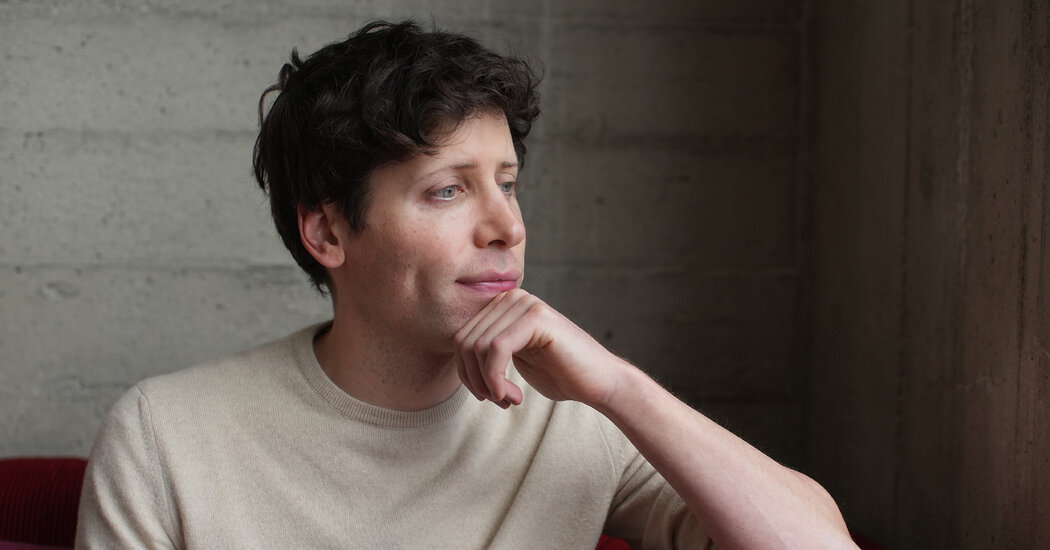
 Technology
Technology 
Sam Altman and Greg Brockman, two top executives at OpenAI who left the company after a dramatic board meeting on Friday, are talking again with board members about returning to the artificial intelligence start-up, two people with knowledge of the matter said.
The discussions follow an outcry after Mr. Altman, 38, was ousted from his role as OpenAI’s chief executive. Since then, OpenAI’s investors and Mr. Altman’s supporters have pressured the board members of the start-up to bring Mr. Altman back, six people with knowledge of the situation said. They spoke on the condition of anonymity because the talks are confidential.
Microsoft, which has invested $13 billion in OpenAI, was leading the pressure campaign, one of the people said. OpenAI investors who have expressed support for Mr. Altman to be reinstated were also willing to invest if he were to start a new company, something he began discussing almost immediately after he was forced out, people with knowledge of the situation said.
There is no guarantee that Mr. Altman or Mr. Brockman will be reinstated at OpenAI, the people said. Because of OpenAI’s unique structure — it is controlled by a nonprofit and its board has the power to govern the activities of the subsidiary, where its A.I. work is done — the company’s investors have no official say in what happens to the start-up or who leads it.
OpenAI, Microsoft and Thrive Capital declined to comment. The Verge earlier reported that OpenAI’s board was talking with Mr. Altman about potentially returning to the company.
The new discussions between Mr. Altman, Mr. Brockman and OpenAI’s board were the latest twist in a fast-moving drama at what is perhaps the world’s highest-profile A.I. company.
The San Francisco start-up shot to fame last year when it released the chatbot ChatGPT and showed the power of artificial intelligence. Mr. Altman, a founder of OpenAI, rapidly became the face of the A.I. industry as Google, Meta and other giants raced to take the lead in the technology. But on Friday, OpenAI abruptly announced that its board had removed Mr. Altman as chief executive, saying “he was not consistently candid in his communications with the board.” The board did not elaborate.
Mr. Altman was asked to join a video meeting with OpenAI’s board at noon on Friday and was immediately fired, Mr. Brockman has said. Mr. Brockman said that even though he was the chairman of the company’s board, he was not part of the meeting. He later said he was quitting the company.
OpenAI had six board members before Mr. Altman was forced out and Mr. Brockman left. The other four are Ilya Sutskever, an OpenAI founder; Adam D’Angelo, the chief executive of Quora, the question-and-answer site; Helen Toner, a director of strategy at Georgetown’s Center for Security and Emerging Technology; and Tasha McCauley, an entrepreneur and computer scientist.
Before Mr. Altman’s ouster, tensions had been rising at OpenAI as the company’s profile soared. In particular, Mr. Sutskever, a respected A.I. researcher, had grown increasingly worried that OpenAI’s technology could be dangerous and that Mr. Altman was not paying enough attention to that risk, three people familiar with his thinking have said. Mr. Sutskever also objected to what he saw as his diminished role inside the company.
Mr. Altman’s firing drew attention to a longtime division in the A.I. community between people who believe A.I. is the biggest business opportunity in a generation and others who worry that moving too fast could be dangerous.
The ouster also caused waves across the tech industry, where Mr. Altman is well known not only from OpenAI but from his years leading Y Combinator, the Silicon Valley start-up incubator. Many of OpenAI’s investors — which include Microsoft, Thrive Capital and Sequoia Capital — did not learn about Mr. Altman’s exit until a minute before his departure was announced or after the news became public.
By Friday evening, Mr. Altman and Mr. Brockman were racing to set up a new A.I. company, three people familiar with the situation have said. They also considered which OpenAI employees would join them. At least three other OpenAI employees have resigned over the last two days.
Mr. Altman took a break to poke at OpenAI’s board on social media, with a joke threatening to start “going off,” or speaking candidly, about the situation.
Tech investors also rushed to show their support for Mr. Altman and hinted that they would back his next venture.
Alfred Lin, an investor at Sequoia Capital, a venture capital firm that invested in OpenAI and Mr. Altman’s first start-up, Loopt, posted on X that he looked forward to “the next world-changing company” that Mr. Altman and Mr. Brockman would build. Eric Schmidt, Google’s former chief executive, posted, “I can’t wait to see what he does next.”
While still leading OpenAI, Mr. Altman had pitched several ideas for new projects to investors and others in recent months. During a fund-raising trip last month in the Middle East, Mr. Altman spoke about A.I.-related projects, including a plan to develop custom chips for A.I. that would compete with the chip company Nvidia.
Mr. Altman also spoke with Masayoshi Son, the chief executive and billionaire founder of the tech conglomerate SoftBank, about investing in an effort to build an A.I. device with Jony Ive, the former chief design officer at Apple.
But by Saturday afternoon, Mr. Altman and Mr. Brockman were also talking with OpenAI about a return.
Karen Weise and Tripp Mickle contributed reporting.
24World Media does not take any responsibility of the information you see on this page. The content this page contains is from independent third-party content provider. If you have any concerns regarding the content, please free to write us here: contact@24worldmedia.com